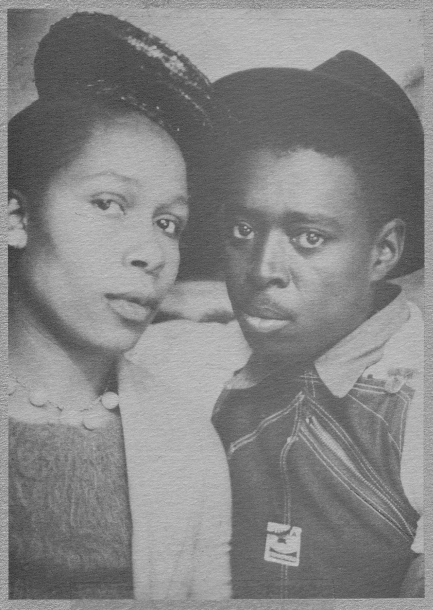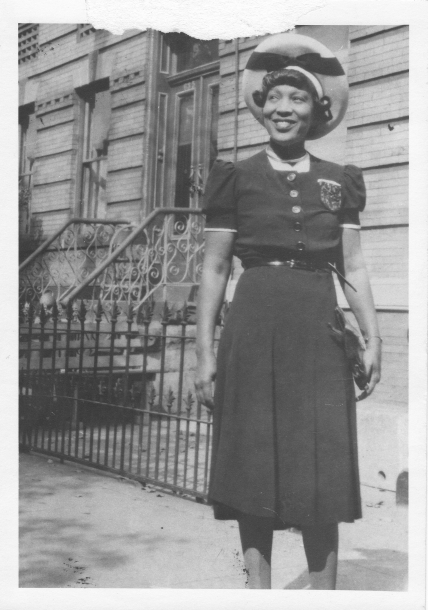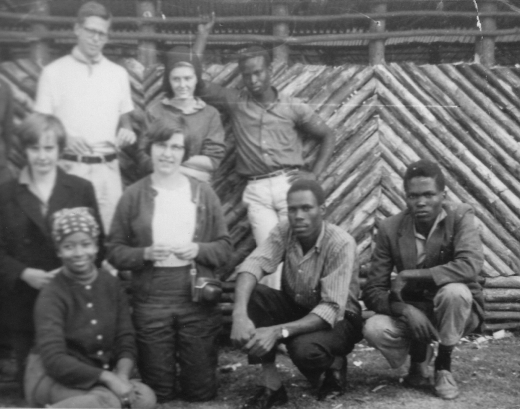In Love and Trouble (14 page)
Read In Love and Trouble Online
Authors: Alice Walker

The doctor was bending over the bed and turned back to tell us for at least the tenth time in the history of my family that, alas, old Mr. Sweet Little was dying and that the children had best not see the face of implacable death (I didn’t know what “implacable” was, but whatever it was, Mr. Sweet was not!). My father pushed him rather abruptly out of the way saying, as he always did and very loudly for he was saying it to Mr. Sweet, “To hell with dying, man, these children want Mr. Sweet”—which was my cue to throw myself upon the bed and kiss Mr. Sweet all around the whiskers and under the eyes and around the collar of his nightshirt where he smelled so strongly of all sorts of things, mostly liniment.
I was very good at bringing him around, for as soon as I saw that he was struggling to open his eyes I knew he was going to be all right, and so could finish my revival sure of success. As soon as his eyes were open he would begin to smile and that way I knew that I had surely won. Once, though, I got a tremendous scare, for he could not open his eyes and later I learned that he had had a stroke and that one side of his face was stiff and hard to get into motion. When he began to smile I could tickle him in earnest because I was sure that nothing would get in the way of his laughter, although once he began to cough so hard that he almost threw me off his stomach, but that was when I was very small, little more than a baby, and my bushy hair had gotten in his nose.
When we were sure he would listen to us we would ask him why he was in bed and when he was coming to see us again and could we play with his guitar, which more than likely would be leaning against the bed. His eyes would get all misty and he would sometimes cry out loud, but we never let it embarrass us, for he knew that we loved him and that we sometimes cried too for no reason. My parents would leave the room to just the three of us; Mr. Sweet, by that time, would be propped up in bed with a number of pillows behind his head and with me sitting and lying on his shoulder and along his chest. Even when he had trouble breathing he would not ask me to get down. Looking into my eyes he would shake his white head and run a scratchy old finger all around my hairline, which was rather low down, nearly to my eyebrows, and made some people say I looked like a baby monkey.
My brother was very generous in all this, he let me do all the revivaling—he had done it for years before I was born and so was glad to be able to pass it on to someone new. What he would do while I talked to Mr. Sweet was pretend to play the guitar, in fact pretend that he was a young version of Mr. Sweet, and it always made Mr. Sweet glad to think that someone wanted to be like him—of course, we did not know this then, we played the thing by ear, and whatever he seemed to like, we did. We were desperately afraid that he was just going to take off one day and leave us.
It did not occur to us that we were doing anything special; we had not learned that death was final when it did come. We thought nothing of triumphing over it so many times, and in fact became a trifle contemptuous of people who let themselves be carried away. It did not occur to us that if our own father had been dying we could not have stopped it, that Mr. Sweet was the only person over whom we had power.
When Mr. Sweet was in his eighties I was studying in the university many miles from home. I saw him whenever I went home, but he was never on the verge of dying that I could tell and I began to feel that my anxiety for his health and psychological well-being was unnecessary. By this time he not only had a moustache but a long flowing snow-white beard, which I loved and combed and braided for hours. He was very peaceful, fragile, gentle, and the only jarring note about him was his old steel guitar, which he still played in the old sad, sweet, down-home blues way.
On Mr. Sweet’s ninetieth birthday I was finishing my doctorate in Massachusetts and had been making arrangements to go home for several weeks’ rest. That morning I got a telegram telling me that Mr. Sweet was dying again and could I please drop everything and come home. Of course I could. My dissertation could wait and my teachers would understand when I explained to them when I got back. I ran to the phone, called the airport, and within four hours I was speeding along the dusty road to Mr. Sweet’s.
The house was more dilapidated than when I was last there, barely a shack, but it was overgrown with yellow roses which my family had planted many years ago. The air was heavy and sweet and very peaceful. I felt strange walking through the gate and up the old rickety steps. But the strangeness left me as I caught sight of the long white beard I loved so well flowing down the thin body over the familiar quilt coverlet. Mr. Sweet!
His eyes were closed tight and his hands, crossed over his stomach, were thin and delicate, no longer scratchy. I remembered how always before I had run and jumped up on him just anywhere; now I knew he would not be able to support my weight. I looked around at my parents, and was surprised to see that my father and mother also looked old and frail. My father, his own hair very gray, leaned over the quietly sleeping old man, who, incidentally, smelled still of wine and tobacco, and said, as he’d done so many times, “To hell with dying, man! My daughter is home to see Mr. Sweet!” My brother had not been able to come as he was in the war in Asia. I bent down and gently stroked the closed eyes and gradually they began to open. The closed, wine-stained lips twitched a little, then parted in a warm, slightly embarrassed smile. Mr. Sweet could see me and he recognized me and his eyes looked very spry and twinkly for a moment. I put my head down on the pillow next to his and we just looked at each other for a long time. Then he began to trace my peculiar hairline with a thin, smooth finger. I closed my eyes when his finger halted above my ear (he used to rejoice at the dirt in my ears when I was little), his hand stayed cupped around my cheek. When I opened my eyes, sure that I had reached him in time, his were closed.
Even at twenty-four how could I believe that I had failed? that Mr. Sweet was really gone? He had never gone before. But when I looked up at my parents I saw that they were holding back tears. They had loved him dearly. He was like a piece of rare and delicate china which was always being saved from breaking and which finally fell. I looked long at the old face, the wrinkled forehead, the red lips, the hands that still reached out to me. Soon I felt my father pushing something cool into my hands. It was Mr. Sweet’s guitar. He had asked them months before to give it to me; he had known that even if I came next time he would not be able to respond in the old way. He did not want me to feel that my trip had been for nothing.
The old guitar! I plucked the strings, hummed “Sweet Georgia Brown.” The magic of Mr. Sweet lingered still in the cool steel box. Through the window I could catch the fragrant delicate scent of tender yellow roses. The man on the high old-fashioned bed with the quilt coverlet and the flowing white beard had been my first love.
Alice Walker (b. 1944), one of the United States’ preeminent writers, is an award-winning author of novels, stories, essays, and poetry. Walker was the first African-American woman to win the Pulitzer Prize for fiction, which she won in 1983 for her novel
The Color Purple
, also a National Book Award winner. Walker has also contributed to American culture as an activist, teacher, and public intellectual. In both her writing and her public life, Walker has worked to address problems of injustice, inequality, and poverty.
Walker was born at home in Putnam County, Georgia, on February 9, 1944, the eighth child of Willie Lee Walker and Minnie Tallulah Grant Walker. Willie Lee and Minnie Lou labored as tenant farmers, and Minnie Lou supplemented the family income as a house cleaner. Though poor, Walker’s parents raised her to appreciate art, nature, and beauty. They also taught her to value her education, encouraging her to focus on her studies. When she was a young girl, Alice’s brother accidentally shot her in the eye with a BB, leaving a large scar and causing her to withdraw into the world of art and books. Walker’s dedication to learning led her to graduate from her high school as valedictorian. She was also homecoming queen.
Walker began attending Spelman College in Atlanta in 1961. There she formed bonds with professors such as Staughton Lynd and Howard Zinn, teachers that would inspire her to pursue her talent for writing and her commitment to social justice. In 1964 she transferred to Sarah Lawrence College, where she completed a collection of poems in her senior year. This collection would later become her first published book,
Once
(1965). After college, Walker became deeply engaged with the civil rights movement, often joining marches and voter registration drives in the South. In 1965 she met Melvyn Rosenman Leventhal, a civil rights lawyer, whom she would marry in 1967 in New York. The two were happy, before the strain of being an interracial couple in Mississippi caused them to separate in 1976. They had one child, Rebecca Grant Walker Leventhal.
In the late sixties through the seventies, Walker produced several books, including her first novel,
The Third Life of Grange Copeland
(1970), and her first story collection,
In Love & Trouble
(1973). During this time she also pursued a number of other ambitions, such as working as an editor for
Ms.
magazine, assisting anti-poverty campaigns, and helping to bring canonical novelist Zora Neale Hurston back into the public eye.
With the 1982 release of her third novel,
The Color Purple
, Walker earned a reputation as one of America’s premier authors. The book would go on to sell fifteen million copies and be adapted into an Academy Award–nominated film by director Steven Spielberg. After the publication of
The Color Purple
, Walker had a tremendously prolific decade. She produced a number of acclaimed novels, including
You Can’t Keep a Good Woman Down
(1982),
The Temple of My Familiar
(1989), and
Possessing the Secret of Joy
(1992), as well as the poetry collections
Horses Make a Landscape Look More Beautiful
(1985) and
Her Blue Body Everything We Know
(1991). During this time Walker also began to distinguish herself as an essayist and nonfiction writer with collections on race, feminism, and culture, including
In Search of Our Mothers’ Gardens
(1983) and
Living by the Word
(1988). Another collection of poetry,
Hard Times Require Furious Dancing
, was released in 2010, followed by her memoir,
The Chicken Chronicles
, in the spring of 2011.
Currently, Walker lives in Northern California, and spends much of her time traveling, teaching, and working for human rights and civil liberties in the United States and abroad. She continues to write and publish along with her many other activities.

Alice’s parents, Minnie Tallulah Grant and Willie Lee Walker, in the 1930s. Willie Lee was brave and hardworking, and Minnie Lou was strong, thoughtful, and kind—and just as hardworking as her husband. Alice remembers her mother as a strong-willed woman who never allowed herself or her children to be cowed by anyone. Alice cherished both of her parents “for all they were able to do to bring up eight children, under incredibly harsh conditions, to instill in us a sense of the importance of education, for instance, the love of beauty, the respect for hard work, and the freedom to be whoever you are.”

Harlem Renaissance writer Zora Neale Hurston during her days in New York City. Hurston, who fell into obscurity after her death, had a profound influence on Walker. Indeed, Walker’s 1975 essay, “In Search of Zora Neale Hurston,” played a crucial role in resurrecting Hurston’s reputation as a major figure in American literature. Walker paid further tribute to her “literary aunt” when she purchased a headstone for Hurston’s grave, which had gone unmarked for over a decade. The inscription on the tombstone reads, “A Genius of the South.”

Alice (front) in Kenya in 1965. She traveled there to help build the school pictured in the background as part of the Experiment in International Living Program. It was here that Walker first witnessed the practice of female genital mutilation, a practice that she has since worked to eradicate.
